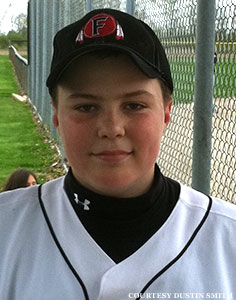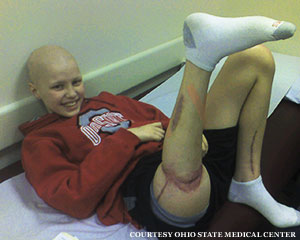After the crying stopped, a 10-year-old boy had an awful decision to make.

Dugan Smith had cancer in his thigh bone. He was going to die without extreme measures. His dad had an opinion on what to do. So did his mom. But they decided to ask their son, who would hopefully be able to live with whatever came next.
Dugan needed an amputation. That was certain. But there were three options after that. The first was a cadaver bone to replace the cancerous thigh bone. The second was a metal bone with a mechanical knee. Dugan's father, Dustin, figured that was the way to go. It would give his son some pain, but decent mobility.
"Nope, I don't want that," Dugan told his parents, "because I can't play sports."
The third choice was extremely rare. It was a procedure done maybe a dozen times a year in the U.S. It's called rotationplasty. Dugan's lower leg would be detached, turned 180 degrees, and reattached higher. That would allow his ankle muscles and ligaments to do the job of his knee. Basically: his ankle would serve as a backwards knee. So his foot would be at the end of his thigh, and he could place it into a prosthetic and have more control over it.
Dugan lit up. "I want that one," he said.
The boy didn't seem to care about the risks, which were several. He didn't care about the recovery time, which would be long. And he didn't care about the possible awkwardness, both physically and emotionally.
Dugan wanted to play baseball.
"It wasn't a question in his mind," Dustin says.
Dad wasn't quite ready to take yes for an answer. He was Dugan's coach, and he didn’t want a charity case on his hands.
"I'm going to be pushing you," he told his only boy. "You're not going to like me very much."
Dugan didn't care. The decision had been made: Baseball or bust.
It's hard not to wonder if Dugan would be alive without baseball. He was a 10-year-old fourth grader on his dad's sixth grade team in suburban Columbus, Ohio when he slid into second and felt a pinch of pain.
The pain only grew over weeks. Dugan got an X-ray and his parents, now divorced, thought it was bursitis. He was a tall kid, stretching toward 6 feet tall as a preteen. So maybe there was extra pressure on that knee.
Doctors put Dugan on crutches and told him to stop playing baseball. His parents got him an old wheelchair as well, to help him get around. But two days before the end of the fourth-grade school year, his friends were wheeling Dugan to Dairy Queen and he fell out of the chair and broke his leg.
Doctors did a biopsy. Dugan had a form of cancer so rare that only 400 American children get it every year. He had a tumor the size of a softball in his leg. Dugan was placed in a half-body cast up to his waist. He chose Disney World for his Make-A-Wish trip.
The surgery would be brutal. It took a total of 25 hours. There was so much swelling that doctors had to leave the leg wide open and Dugan could actually see his muscles flex as he tried to recover. He spent two weeks in the ICU. Then chemo. Then the pain of adjusting to the first prosthetic leg. Then four more prosthetic replacement legs after that.
You'd think, just once, Dugan would say, "Enough." Maybe during one sleepless night or one agonizing moment, he'd give up.

Nope.
"Never," says Dustin. "Not once. We knew what he'd be able to do and what he wants to do. He wants to play."
Dugan is now 13. He's a member of his junior high school baseball team. And he's not a DH or a pinch-hitter. He pitches. He plays first base. And he has a regular spot in the lineup. It's been that way for more than a year now.
Yes, he limps noticeably. His left leg is designed to be longer so his right leg can grow to match it.
Most teens and adults would have just gone with a traditional amputation. Mayerson, the surgeon at Ohio State Medical Center, is considered an expert in rotationplasty and he's only done three. But Dugan is a special case, and a special kid.
"The reason we do these is for a very young child who has a lot of growing to do," says Mayerson. "Dugan was perfect. His dream was to play baseball. He said, 'Do whatever you need to do, but I need to play baseball.'"
Dugan's chances of recurrence are slim. The cancer is out. The bat is back in the boy's hands.
And now Dugan has another dream.
He wants to play football.




